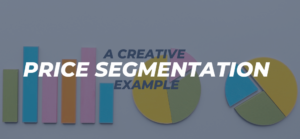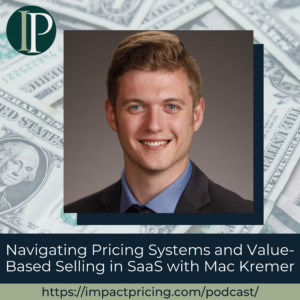
In this episode, Anne shares the power behind pricing people working with sales, finance, and marketing departments in order to better market a product in a competitive market.
Podcast: Play in new window | Download
Why you have to check out today’s podcast:
- Discover why pricing people serve as the connector between the finance, marketing, and sales departments of a company
- Understand why rapport with those internally involved in the business is essential in marketing a product
- Know how you can establish an effective rapport with other teams aside from yours through tips from an expert
“Establishing the rapport, especially with the sales and leadership team, treating your sales leaders as business partners, and make sure they know – not that you’re going to necessarily agree all the time – but that they have a voice and you are going to be collaborative with them.”
– Anne Warren
Topics Covered:
01:40 – From being an auditor to becoming a pricing person
03:20 – Pricing people being that connector between finance, marketing, and sales
05:41 – Learning about the need to be collaborative across these departments
06:38 – How Anne works with salespeople
08:42 – The context of Anne’s script when talking to customers
10:24 – Mark’s four points with regards to writing a price increase letter
11:09 – Why raising prices shouldn’t be an intimidating initiative
13:33 – How Anna does what needs to be done while working with finance and salespersons
14:59 – Marketing people know the value of their products better than pricing people
16:23 – Seeing the collaboration in different perspectives
18:08 – Having a value statement and being able to share it
19:35 – Product managers being too far removed from value
22:18 – Anne’s piece of pricing advice for today’s listeners
Key Takeaways:
“It’s important to take yourself outside of your role as a pricing person or as a finance person, and really think and learn, most importantly, about the other person’s goals.” – Anne Warren
“It’s the pricing person’s role to be that connector between finance, marketing, and sales.” – Anne Warren
“Being transparent. Don’t try to hide. Don’t try to be mysterious. Be honest with your customers. I think that will definitely go a long way. And the letters that go out are fine, but I think a live discussion between a salesperson and their customer works wonders as well.” – Anne Warren
“You want them to feel good about their product. You want to help call out that value proposition maybe in more less technical terms, if it’s a technical product, and more about the value prop to the end user customer or B2B customer. What’s in it for them and how can we monetize that? Help bridge the gap to get the salespeople confident.” – Anne Warren
“Never underestimate the power of a confident salesperson.” – Anne Warren
“If you’re starting a new job as a pricing professional, I feel strongly you also need a good relationship with finance, but the sales teams in particular, if you have good rapport with them, you’re going to make huge inroads and be very successful as a pricing professional.” – Anne Warren
“Try to be as natural as you can be, as open and transparent. What is your role? Your role is to be a partner. That is the first message you should deliver to establish that rapport and mean it. Be that partner and establish that early on in the relationship. That’s the best thing you can do that will give you firepower for initiatives that you want to perform later on.” – Anne Warren
People / Resources Mentioned:
- Shure Incorporated: http://www.shure.com
- Ameritech / AT&T: https://www.att.com/
Connect with Anne Warren:
- LinkedIn: https://www.linkedin.com/in/anne-warren-214ab745/
- Email: [email protected]
Connect with Mark Stiving:
- LinkedIn: https://www.linkedin.com/in/stiving/
- Email: [email protected]
Full Interview Transcript
(Note: This transcript was created with an AI transcription service. Please forgive any transcription or grammatical errors. We probably sounded better in real life.)
Anne Warren
Establishing the rapport, especially with the sales and leadership team, treating your sales leaders as business partners, and make sure they know – not that you’re going to necessarily agree all the time – but that they have a voice and you are going to be collaborative with them.
[Intro]
Mark Stiving
Today’s podcast is sponsored by Jennings Executive Search.
I had a great conversation with John Jennings about the skills needed in different pricing roles. He and I think a lot alike.
If you’re looking for a new pricing role or if you’re trying to hire just the right pricing person, I strongly suggest you reach out to Jennings Executive Search. They specialize in placing pricing people. Say that three times fast.
Mark Stiving
Welcome to Impact Pricing, the podcast where we discuss pricing, value, and the collaborative relationship between them so your company can win more business at higher prices. I’m Mark Stiving, and our guest today is Anne Warren.
Here are three things you’d want to know about Anne before we start.
She is the Senior Director of Global Pricing at Shure – the only microphone I ever use. She started out as an accountant and an auditor – I’m not sure I could think of a more boring job but she’ll convince me otherwise – and she’s been leading pricing teams for about 20 years.
Welcome, Anne.
Anne Warren
Thank you.
Mark Stiving
Okay. How did you get into pricing?
Anne Warren
I got into pricing approximately five or six years after I left audit. I typically had been in roles, kind of liaison roles, so bridging the gap between either engineering and finance department or marketing and the finance department. So, I was actually recruited within Ameritech – it was Ameritech at the time; now AT&T – and I was asked to move in to a pricing manager role. So, that’s how I started.
Mark Stiving
So, you were just invited to it. It wasn’t a project. It wasn’t anything. It’s just like, “Okay, I’ll try it.”
Anne Warren
Exactly. And I really grew to love it. I love numbers, but more importantly, I like the interface between diverse groups, diverse functions within a company.
Mark Stiving
So, isn’t it funny? One of the things you just said – you love numbers, and you come from accounting and audit, so of course you do, but isn’t it funny that most people think pricing is a number, and then once you get into it, you realize it isn’t?
Anne Warren
Absolutely. I think of pricing as both an art and a science, and there’s a tremendous amount of psychology involved in pricing. I think people don’t necessarily think about that.
Mark Stiving
Yes. So, that’s outside the world, right? When we talk about behavioral economics and how our customers make decisions and all the psychological aspects. But what we’re going to talk about today is the psychology inside our company, because this is maybe harder, because everybody has an opinion and thinks their opinion matter. I’m sorry, their opinion does matter. My apologies for saying that.
So, what high level thoughts on collaborating with your peers are we going to start with?
Anne Warren
Well, I think it’s important to take yourself outside of your role as a pricing person or as a finance person, and really think and learn, most importantly, about what are the other person’s goals? Okay, salespeople. What are their goals? What are some things that may make them nervous in terms of being able to achieve their goals? And certainly, pricing is one of those hot buttons that really makes it very, very challenging for pricing and finance people to interface effectively with sales teams in particular.
Mark Stiving
Okay, I couldn’t agree more, but let’s start with finance people for a second. I actually like finance people from the perspective of they want higher margins so they want higher prices, so they’re with me, they’re on my team, trying to get prices up; I love that. But what I don’t like about finance people is when they do pricing, they only know costs; they don’t know value.
Anne Warren
Absolutely. And I feel very strongly that it’s the pricing person’s role to be that connector between finance, marketing, and sales.
So, one of the initiatives that I am working on is how do we go to market with new products? How do we, let’s say, take product management and the finance view and the sales perspective and the customer perspective, and weave those all together so that we can collect more and make finance happy? We could collect more on every unit of sale. But we really are looking at what do the customers value? And can we somehow tie a number to that? Like, what’s it worth? And keep it simple, right? Like, alright, we can be 10% higher than our competition, because this is more valuable. It could be time saving for a customer, or something else that they would value.
Mark Stiving
So how did you learn that you had to be collaborative across these different departments?
Anne Warren
Great question. I think, as I mentioned to you before we started the podcast, I began my career in audit and multiple clients, you know, 22 years old, probably had 20 or 30 clients in my first year, and really trying to establish rapport and find common ground. So, what is it about the salesperson’s point of view? Maybe we do have things in common. Certainly, pricing and finance people do. But you’re right. Sometimes, finance teams – they’re very focused on costs, not as much value. And there’s also challenges in terms of bridging that gap between how a salesperson communicates vs. a finance person.
And so, I feel, again, in a pricing role, you’re really that connector.
Mark Stiving
Yeah. So, pricing and sales is probably the most challenging of all of the different collaborations, I think, because salespeople, they’re trying to represent their clients, their customers, they’re trying to say, “Hey, my customer needs a better price,” and so they’re trying to negotiate inside our company to get their customer a better price. And so oftentimes, we think, “Hey, you should be representing us, not the customer,” but their job is to represent both to the best of their ability.
How do you handle that? How do you work with salespeople?
Anne Warren
Well, I think establishing that empathy for, boy, if I was having that conversation with a client or customer, how would I want to approach that? And I think it’s all about knowledge is empowerment.
So, what I’ve found is, as an example, if we have to do a price increase or we should do a price increase, empowering the salespeople to have some voice with us.
So as an example, if we have a certain product that’s really competitive, maybe we shouldn’t increase that particular price, but we have a whole host of other products where we can do that, and give them some, I call it a script. Give them a few bullet points of, “Hey, here’s what I would say if I were having a discussion with the customer.” I’ve also personally offered to go and I have done this healthy conversation with the customer. And give sales the confidence that they need. If they’re confident, often, they will come up with a better script for their customer than I would. I’m just planting the seed. And I found that to be really effective, and it’s helped me establish personal credibility within companies.
Mark Stiving
Yeah. So first off, being willing to go out and talk to customers and say, “Hey, we’re going to raise your prices”, and be the bad guy for the salesperson.
Anne Warren
Absolutely.
Mark Stiving
I think that’s a huge win. I’ve loved the fact that you said, here’s a script.
Now, I have blogged probably three, four, five times on how to raise prices, and I typically give people, “Here’s the four things you’d want to put in the email that you’re going to send out to your customers.” I want to know, what’s in your script?
Anne Warren
Well, it will really, to your earlier point about just being so cost-focused, you have to be a little bit careful with that one, certainly in this environment. I think it’s perfectly acceptable to highlight that and definitely be accepted by most customers. But I do feel as if bringing in a script around value.
So, for example, if you have a company where your customer service is so stellar and you know it’s stellar, relative to cheaper alternatives. In order for us to continue to offer live support or what have you, it loosely right relates back to cost, because if you don’t raise your prices, ultimately, it’s going to come back to bite you, but certainly including those things, being transparent. Don’t try to hide. Don’t try to be mysterious. Be honest with your customers. I think that will definitely go a long way. And you know, the letters that go out are fine, but I think a live discussion between a salesperson and their customer works wonders as well.
Mark Stiving
Oh, I think it’s way better. When I was talking about the letters, I’m really referring to Netflix just sent me the price increase letter. So, what was that one like?
So, I’m going to give everybody in here my four tips – and you can tell me if you use these or don’t use these – but my four tips I always say when you’re going to send out one of these letters is number one, we blame costs, right? It’s really the only reason people expect for price increase. They don’t want you to say, “Hey, we want more profit.” So, we just say, “Our costs are going up. We don’t really have a choice.”
Number two, we try to do something nice for our customers if it’s recurring revenue. So, “We’ll hold your hold your price constant for six months, and then we’ll bring it up.”
Number three. “We talked about all the value we’ve been delivering and haven’t yet charged you for. So, isn’t that wonderful that we’re delivering so much more?”
And then number four is, “Oh. If it’s true, we haven’t raised prices for three years. We’ve been holding the price constant.”
Anne Warren
Definitely.
Mark Stiving
So those are my four points that I always write in a price increase letter. Are they part of your script?
Anne Warren
Definitely. I think you nailed it. You want to keep it simple, short, and to the point. But at the same time, people, they don’t want to feel like they’re gouged. And again, just going back, I like the fact that certain companies, they really had to get out of their comfort zone because of the current environment. However, as a normal course of business, raising prices shouldn’t be this big, intimidating initiative. Certainly, we expect our salaries to increase every year. We know as consumer shopping, there’s more air in that potato chip bag. So, I think, just getting more and more conversation and just making it as part of everyday conversations, just like financials are reviewed, and people go through “How are you doing? Your expenses relative to your budget?” We should be having more conversations about just pricing and the power of that profit lever.
Mark Stiving
Yeah. And I think what you’re implying there, which I don’t think you stated directly, was if we could get customers to just expect an annual price increase, then it makes the conversation so much easier than once every 10 years. “Hey, we’re going to raise your prices.”
Anne Warren
Right. Absolutely. We want that one.
Mark Stiving
I think Netflix is doing that now. They’re training us to get that annual price increase.
Anne Warren
Oh, that is a definite. Well, it’s funny because I actually- I won’t name the gym that I belong to, because there are so many, but I am constantly baffled based on what I pay. I pay the same price forever. But I go in and the microphones aren’t working or the caliber of instructors has depleted, and I’m just thinking, “If only you’d raise everybody’s subscription ¢50, not even $1, ¢50 a month, you could get a new microphone. Of course, I think about microphones. That’s where I work. But that’s just one example.
I feel very strongly that, yeah, it shouldn’t be such an intimidating initiative.
Mark Stiving
No, it really shouldn’t. Absolutely.
Okay. So, we talked a little bit about finance. We’ve talked quite a bit about sales. Tell me about marketing and/or product management. How do you work with what’s important to work with when you’re working with those two departments?
Anne Warren
Well, I think it goes back to the same basic tenants, and that is, you want them to feel good about their product. You want to help call out that value proposition maybe in more less technical terms, if it’s a technical product, and more about the value prop to the end user customer or B2B customer. What’s in it for them and how can we monetize that?
And then, help bridge the gap to get the salespeople confident. And that’s tough with the timing, because sometimes the products are being developed and we won’t actually see the product for three, four or five years, but at the same time, you’re helping, again, bridge that gap between what the product can technically do if it’s a manufactured type product, and the actual benefits that it brings, and then customer’s willingness to pay.
So again, it’s kind of bridging that gap.
Mark Stiving
Yeah. So, it’s kind of funny because it feels to me like value – other than finance – value is the single thing that holds all of these departments together, or at least it should be.
And so, let’s just talk about marketing for a second.
I would have thought that marketing knows better than pricing what the value propositions are, what the value of the product is, because we, as pricing people, we have to manage hundreds, thousands of products, where marketing has a much smaller subset, and they should understand their market segment better.
Anne Warren
I agree. And I think, generally speaking, most marketers do. I think, though, having that pricing person, because we’re not as close, we might ask what are deemed stupid questions. I’ll always say, “Pardon my lack of knowledge in this area, but can you tell me why would I buy this? Who’s the target customer? Why would I buy this?” And usually based on the response, it’s really just a tweak to bring it into dollars vs. works.
And again, I’ll say, one of my expressions is never underestimate the power of a confident salesperson. Getting the sales people excited and watching the product managers bring something to life and creating that collaboration is really, for me, personally, is a great feeling.
Mark Stiving
Yeah. I’m completely with you. I’m just trying to explore where people fall short on this. Because to you and I, it seems so obvious that we should be out selling value and marketing value, and yet, people don’t see it the way we do. And why not?
Anne Warren
Right. I don’t think that it’s intentional. I don’t think people are intentionally doing anything to say, “Oh, I don’t want to work with this person or that person.” I think it comes down to just being so ingrained in the details, and it’s very easy to get pulled into, well, we have to develop this product, and there’s so many technical issues.
If you ever sit in on a call, like a technical call, which I do once in a while just to bring myself a little bit up to speed, and immediately, I’m completely overwhelmed for two reasons. One is it’s not my core competency. And two is just the amount of details that are included.
So, it’s very easy to get, I don’t want to say myopic, but maybe a little bit, just, I’ve got to get this done, I’ve got to get that done. And the communication to your partners is secondary, and it should not be.
So that’s why these roles of pricing and other project managers and other liaison positions I feel are so important to say, “Wait a minute. What do the sales people think? Or what does legal think about this?” Sometimes those get missed, too.
So, I think just being a generalist is super beneficial to the whole process.
Mark Stiving
I agree, completely.
So, I was talking about marketing people and you brought it back to product, which I’m going to do in just a second. When we’re talking about marketing people, though, I think that if we could teach them to think about value constantly, then when they’re out talking to customers or someone says, “Oh, I had this problem and your product helped me solve it”, it’s like ding, ding, ding. Got it. There’s a value statement for me.
Anne Warren
Right.
Mark Stiving
How can I share that with sales? How can I share that or put that on our webpage or whatever it happens to be, right? Or validate it and say it to a lot of people who have this problem?
Anne Warren
Yeah, definitely. I would say to that, you know, to the extent that you have, there’s multiple different ways to design a marketing organization, but what I’ve learned over my career is that the most effective organizations tend to have sort of these liaison roles with sales and they might be aligned by let’s say, target market, which could be your graphic or a specific audience and they get really refined, again, tweaking the technical side and turning it into a value prop. So, you’re absolutely right. Product management, marketing. Sometimes, I’ve even seen it where the roles are one in the same, probably not the most effective situation, although depending on how technical your product is and how technical your audience is, that could work as well. Because really technical people value things that other people may not.
Mark Stiving
Yeah.
So now, I want to take a step back into product management. I used to teach product managers so I understand their world really, really well. And the problem that I think they have is they’re too far removed from value. What does value mean to the customer? And my argument would be why are you building a product if it doesn’t have value to the customer?
Anne Warren
Right. And the answer shouldn’t be “because I can”
Mark Stiving
Or “I was told not to”
Anne Warren
Right. Exactly. I will say sometimes I think products may start off with really good intentions and be connected to the value, but then technical things may happen, things may go wrong. And then over time, oh, boy. That value prop we thought we had, or cutler comes in. That happens too.
But I think, again, making sure that there’s a structure and infrastructure that can really support that constant feedback loop. “Okay, well, let’s remember why are we selling this and who’s going to buy it and why are they buying it?” Very simple, basic questions, and I try to break it down, again, depending on the audience. What is it that they’re looking for? Are they looking for something that will generate revenue for them? Or save them time, which saves them expenses? It doesn’t need to be overly complicated. There’s only a few things on the P&L. Try tying it back from the customer’s P&L point of view, or if it’s the end user, obviously, there’s other interests there. I’m more with B2B expertise.
Mark Stiving
Right. And in my view of the world, if we’re in B2B, and especially if we have a direct salesperson selling B2B products, you should always be able to tie that back to profitability to the customer. Always.
Anne Warren
Always. I did look at these like software as a service. People are saying, “Oh, this is different, it is different, but at the same time, there’s a lot of commonality.” And it goes back to, “Alright. Well, what will the software do that today you have human beings performing these functions?” And now, if you program a software correctly, you will not have to have these three headcount performing this function. So that goes back to your P&L, course you’re paying for this software, you’re paying a monthly fee or annual fee or whatever.
And so, I think, again, just trying to boil it down to the basics. I can’t reinforce that point enough.
Mark Stiving
So, Anne, this has been a lot of fun. I’m going to ask you your last question.
Anne Warren
Okay.
Mark Stiving
What is the one piece of pricing advice you would give our listeners that you think could have a big impact on their business?
Anne Warren
I think it’s going back to; I know it sounds really simple, but establishing the rapport, especially with the sales leadership team, treating your sales leaders as business partners, and make sure they know – not that you’re going to necessarily agree all the time – but that they have a voice and you are going to be collaborative with them.
So, if you’re starting a new job as a pricing professional, that is absolutely the number one course, I feel strongly you also need a good relationship with finance, but the sales teams in particular, if you have good rapport with them, you’re going to make huge inroads and be very successful as a pricing professional.
Mark Stiving
Okay. So how do you build that rapport?
Anne Warren
I think it’s pretty simple. When you start, and I can tell you, I’ve worked some places where been welcomed with open arms, other places, very suspicious, why do we have a pricing person here? I think you try to be as natural as you can be, as open and transparent. What is your role? Your role is to be a partner. That is the first message you should deliver to establish that rapport and mean it. And if you see interesting articles as you peruse LinkedIn, share that with the salespeople. Listen to them. Be an open door. If they’re talking about competitive threat, okay, well, maybe we need to have – not that we like to discount prices – but we might need to have a promotion or a special bundle that the competitors can’t meet.
So, be that partner and establish that early on in the relationship. That’s the best thing you can do that will give you firepower for initiatives that you want to perform later on.
Mark Stiving
I couldn’t agree more. I was actually coaching a client this morning, and I’d said to her, when you have this meeting, I would go in with the attitude that says how can I help you be successful?
Anne Warren
Definitely.
Mark Stiving
And this was just an internal collaborator. We’ll put it that way.
Anne Warren
Right. Well, one of my other favorite expressions is I find the internal marketplace far more dangerous than the external. Every time, it’s a pricing person. So, if you remember that, you’ll do well.
Mark Stiving
Nice.
Anne, thank you so much for your time today. If anybody wants to contact you, how can they do that?
Anne Warren
Through LinkedIn.
Mark Stiving
Alright. So, we’ll have the LinkedIn link for your page.
Anne Warren
My profile.
Mark Stiving
Your profile. There we go. Thank you. For your profile on our show notes.
Episode 162 is all done. Thank you for listening. If you enjoyed this, would you please leave us a rating and a review?
And speaking of reviews, Don said about my new book Win Keep Grow: How to Price and Package to Accelerate Your Subscription Business, he said:
“This book explains in easy-to-understand terms a no-nonsense pricing model that I should have been using from the very beginning of my business. As I’m listening to the audiobook version, I’m completely rethinking my business strategy and I’m excited to implement the changes.”
Thank you, Don. The check’s in the mail.
Finally, if you have any questions or comments about the podcast or pricing in general, feel free to email me: [email protected].
Now, go make an impact.
Mark Stiving
Thanks again to Jennings Executive Search for sponsoring our podcast. If you’re looking to hire someone in pricing, I suggest you contact someone who knows pricing people. Contact Jennings Executive Search.
















